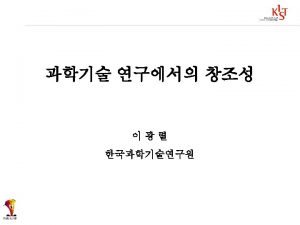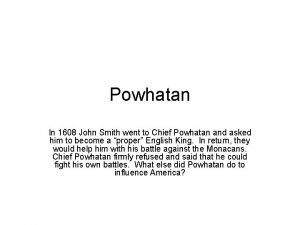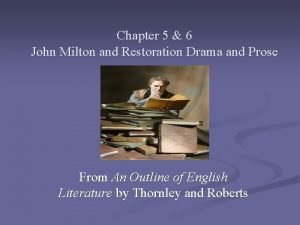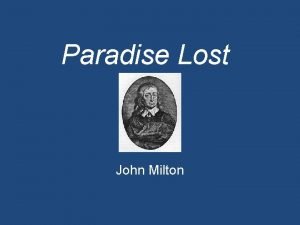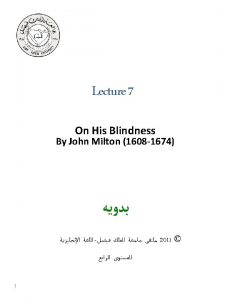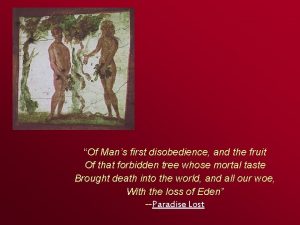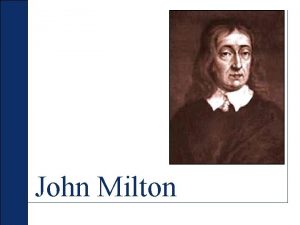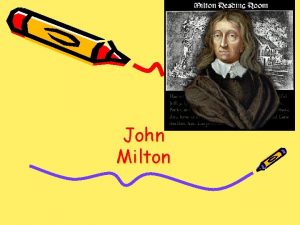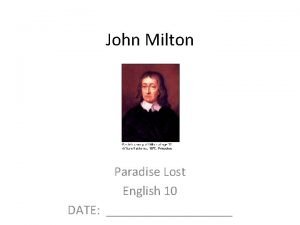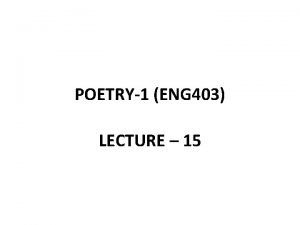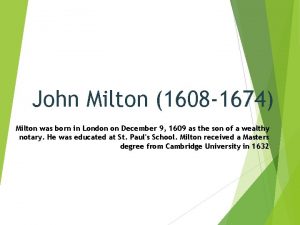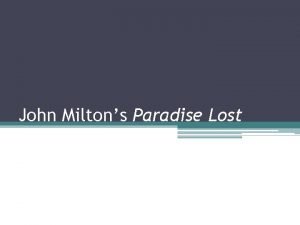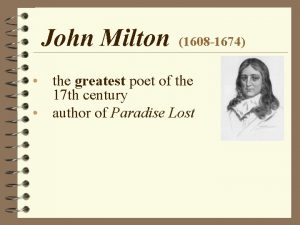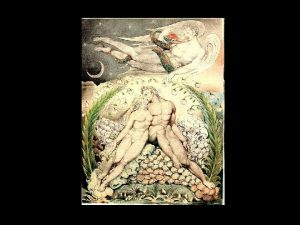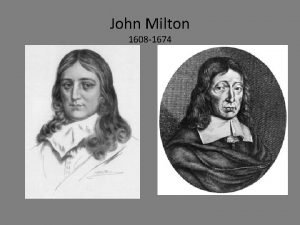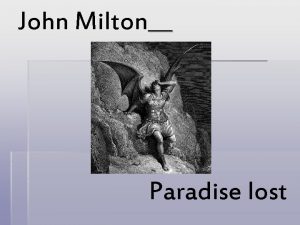John Milton 1608 1674 Son of a composer














- Slides: 14

John Milton 1608 -1674

• • Son of a composer who earned his living as a scrivener (he had been disinherited by his Catholic father) Childhood tutor was a Scottish Presbyterian Attended Cambridge, planned to become an Anglican priest but became disillusioned with the policies of the current Archbishop of Canterbury, William Laud „Milton deliberately set out to follow the steps of the ideal poetic career— beginning with pastoral (the mode of several of his early poems) and ending with epic. His models for this progression were Virgil and Spenser. ” –Norton Anthology, 768

• While at college, he wrote a number of his well-known shorter English poems, among them his "Epitaph on the admirable Dramaticke Poet, W. Shakespeare" (his first poem to appear in print) • First major English poem published in 1629: the hymn „On the Morning of Christ’s Nativity” • 1632 -1638 at home, completed intensive private study, mastered several languages (thanks to his father’s financial support) • 1638 -39 tour of France and Italy (met Galileo under house arrest) Defensio Secunda (recounting his travels, emphasizing his great reputation)

• • • Returned to England during the Bishops’ War, wrote tracts against the episcopacy Married Mary Powell, 19 years younger, in 1642; left him and didn’t return until 3 years later, Milton’s arguments for legality and morality of divorce his celebrated Areopagitica (1644), written in condemnation of prepublication censorship, is among history's most influential and impassioned defences of free speech and freedom of the press The Tenure of Kings and Magistrates (1649) defended the right of the people to hold their rulers to account, and implicitly sanctioned the execution of Charles I Milton's political reputation got him appointed Secretary for Foreign Tongues by the Council of State in March 1649; wrote letters of state in Latin for Oliver Cromwell In October 1649, he published Eikonoklastes, an explicit defence of the regicide, in response to the Eikon Basilike, a phenomenal best-seller popularly attributed to Charles I that portrayed the King as an innocent Christian martyr.

• • • On 24 February 1652, Milton published his Latin defence of the English people Defensio pro Populo Anglicano, also known as the First Defence. Milton's pure Latin prose and evident learning quickly earned him a European reputation He also published his Sonnet 16 in praise of "Cromwell, our chief of men" in 1652 (24 sonnets, Petrarchan rather than Elizabethan); first use of the sonnet for political purposes Wife Mary died in childbirth in 1652, leaving four children, then only son died a few months later; totally blind by 1654 Married again in 1656, but second wife and infant daughter died in 1658 1660 Went into hiding upon the restoration of the monarchy in 1660, eventually granted pardon; married third wife in 1663 Composed Paradise Lost from 1658 -1664 with the help of friends and secretaries, first published in 1667

Milton’s Cottage in Chalfont St. Giles

Paradise Lost „As a young man, John Milton proclaimed himself the future author of a great English epic. He promised a poem devoted to the glory of the nation, centering on the deeds of King Arthur or some other ancient hero. ” –Norton Anthology, 768 • Written in blank verse, 12 books • „To justify the ways of God to men” Book I • Fall of Man, Original Sin and adventures of fallen Satan • Represents a synthesis of Western culture (biblical, classical, medieval, Renaissance) in logical hierarchy, never on equal terms* *from the lecture notes

Characters Satan Adam Eve Son of God the Father Raphael Michael

§ Begins in medias res (in the midst of things) with background info provided later § Two story lines: Satan and Adam and Eve § Satan’s journey to created earth reminiscent of Odysseus or Aeneas § Eve is deceived, Adam heroically but knowingly chooses sin § Adam given a vision by the angel Michael, history of mankind until the Great Flood § „…then wilt thou not be loath to leave this Paradise, but shalt possess a paradise within thee, happier far…” –The archangel Michael to Adam, Book XII, lines 585 -587

„To me shall be the glory sole among the infernal Powers, in one day to have marred what the Almighty styled. ” –Satan, Book IX

„She gave him of that fair enticing fruit with liberal hand: he scrupled not to eat against his better knowledge, not deceived, but fondly overcome with female charm. Earth trembled from her entrails, as again in pangs, and nature gave a second groan. Sky loured, and muttering thunder, some sad drops wept at completing of the mortal sin original; while Adam took no thought, eating his fill…” Book IX, lines 9961005

„But that false fruit far other operation first displayed, carnal desire inflaming, he on Eve began to cast lascivious eyes, she him as wantonly repaid; in lust they burn: till Adam thus ‘gan Eve to dalliance move…’much pleasure have we lost, while we abstained from this delightful fruit, nor known till now true relish, tasting; if such pleasure be in things to us forbidden, it might be wished, for this one tree had been forbidden ten. ” Book IX, lines 1011 -1016, 1022 -1026

„Henceforth I learn, that to obey is best, and love with fear the only God, to walk as in his presence, ever to observe His providence, and on him sole depend, merciful over all his works, with good still overcoming evil, and by small accomplishing great things, by things deemed weak subverting worldly strong, and worldly wise by simply meek; that suffering for truth’s sake is fortitude to highest victory, and to the faithful death the gate of life; taught this by his example whom I now acknowledge my Redeemer ever blest. ” –Adam, Book XII

„…with thee to go, is to stay here; without thee here to stay, is to go hence unwilling; thou to me art all things under heav’n, all places thou, who for my willful crime art banished hence. This further consolation yet secure I carry hence; though all by me is lost, such favor I unworthy am vouchsafed, by me the Promised Seed shall restore. ” –Eve, Book XII
 1674 microscopy
1674 microscopy John smith 1608
John smith 1608 Drupal-composer/drupal-scaffold
Drupal-composer/drupal-scaffold +1608
+1608 1608 yılında iki basit merceği
1608 yılında iki basit merceği John milton drama
John milton drama Iambic pentameter paradise lost
Iambic pentameter paradise lost John milton on his blindness
John milton on his blindness Mans first disobedience
Mans first disobedience John milton life and works
John milton life and works John milton early life
John milton early life Milton on his blindness text
Milton on his blindness text Paradise lost date
Paradise lost date Say first for heaven hides nothing from the view
Say first for heaven hides nothing from the view Political background of puritan age
Political background of puritan age
